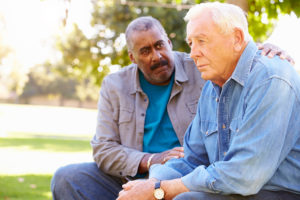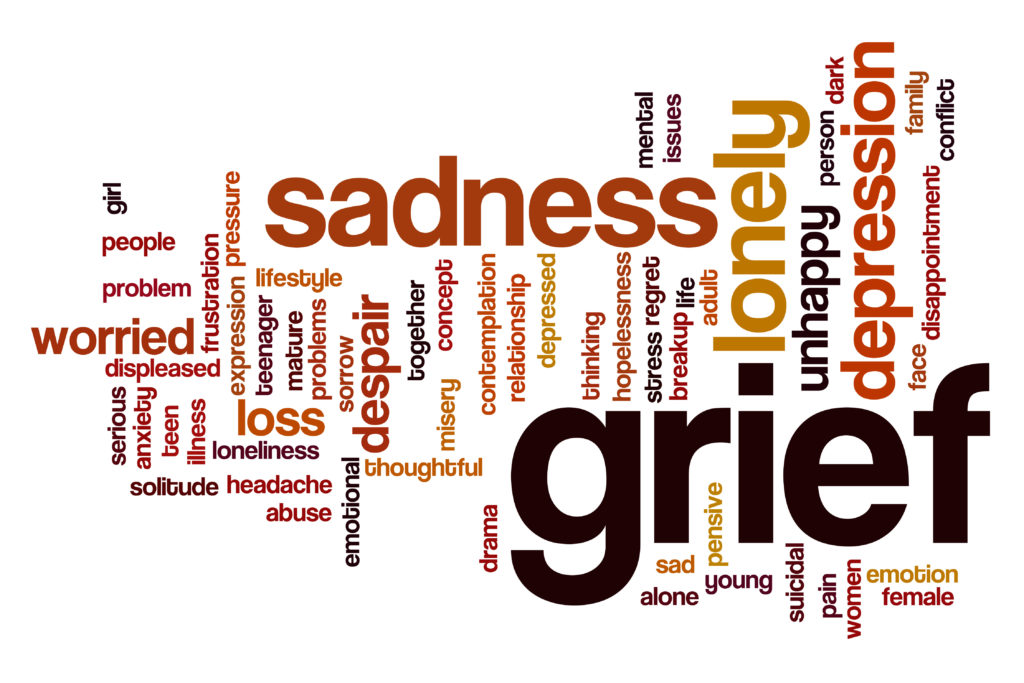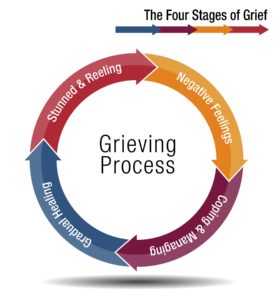Coping With Grief And Loss
Coping with the loss of someone or something you love is one of life’s biggest challenges. You may associate grieving with the death of a loved one—which is often the cause of the most intense type of grief—but any loss can cause grief.

Dealing with Grief and Loss
Grief is a natural response to loss. It’s the emotional suffering you feel when something or someone you love is taken away. Often the mixture of feelings that hits you may seem overwhelming – but you’re not alone. Everyone feels like this when they experience grief for the first time and the feelings can come and go, making bereavement unpredictable.

The Grieving Process
You might think you’re coping quite well, only to feel that you’ve ‘gone backwards’ the very next minute. This is normal, your feelings will vary during the grieving process. The four stages of grief are depicted as a cycle; Stunned & Reeling, Negative Feelings, Coping & Managing and Gradual Healing.
You might be reminded of a good time you spent together, and feel very sad; or get angry when you’re struggling to manage something the person you’ve lost used to deal with. Anxiety and depression are also normal as you are adjusting to your new life and, sometimes, identity.

The pain of grief can also disrupt your physical health, making it difficult to sleep, eat, or even think straight. These are normal reactions to loss—and the more significant the loss, the more intense your grief will be.
The circumstances in which you lost your loved one will have an effect on how you grieve for them. If they had a terminal illness there might be some level of acceptance of their death. If they have died very suddenly – say in an accident, or of a heart attack, you will feel very different and may well be in shock.
Some people start to grieve before the person has died, maybe where there is an illness such as Alzheimer’s, and the person’s character or personality has changed over time.
Grieving can also be more difficult if you’ve lost more than one person, in quick succession, as you may feel you haven’t had time to grieve for one before losing another.
None of these feelings are wrong. As long as you aren’t hurting another person because of your grief, your feelings are valid and you should be able to express and work through them. This is all part of the cycle of grief so allow yourself time to go through these feelings and seek help and support where you can.
A lot of people struggle with someone else’s grief, often because they don’t want to face the thought of losing their own loved ones. It’s also sometimes difficult for other family members to share their grief; some people grieve very privately.
What Can I Do to Make Things Better?
Unfortunately, there is no quick fix.
After a major loss, you may feel affected every day for up to a year or longer. Some practical ways of getting through loss and bereavement are: -
Let people know how you feel – Be kind to yourself and express how you feel. Talking to a friend or one of your family is often a good way to soothe painful emotions. You may also find it useful to talk to a health professional.
Allow yourself to feel sad – Don’t feel bad about showing your emotions – acknowledging how you feel is all part of the grieving process.
Eat healthily – Make sure you eat a healthy, well-balanced diet - it will help you cope.
Sleep – Emotional strain can make you very tired, try and make sure you get regular sleep. If you are having trouble sleeping, see your GP.
Keep to your routine – As well as making sure you eat healthily and sleep well, try to keep to a routine.
Avoid numbing or hiding the pain – Avoid things that numb the pain, such as alcohol.
Don’t try and cope on your own – accept help from others and ask for help when you need it.
Seeking Professional Help
Grief is a natural process and most people will cope with help from family and friends. However, sometimes it might help to find a professional who will listen to you if people close to you are also struggling with their own grief.
Cruse Bereavement Charity have trained listeners who will visit you at home to help you work through your feelings.
A private therapist, who specialises in grief and loss, can also be a good source of help. Trained professionals will give you time and space to express your loss. Meetings are usually weekly, and they will listen to your memories as well as the stresses and strains of losing someone close.

Going to the professionals when you’re feeling like this will help you avoid unresolved grief in the future, where life can become increasingly difficult without the person you’ve lost.
If you experience unresolved grief, when you still find it hard to talk about the loss long after it has happened, visit places that remind you of the person, or are still struggling to sleep or eat, you really must seek professional help. You don’t have to live the rest of your life in pain.
Therapy doesn’t erase your memories of the person you’ve lost, it just helps you come to terms with it, and stops grief affecting other relationships and the practical things you need to get on with to live the rest of your life.
If you need help you can contact:
- The Thalidomide Trust – call us on 01480 474074
- Your GP
- A Counsellor - The Trust can help direct you to trusted and respected counsellors
- Cruse Bereavement Care or call 0808 808 1677 (free) – they offer support, advice and information to all when someone dies
- Samaritans or call 116 123 (free)
- Age UK or call 0800 678 1602 (free)
Talk Together
The Trust's Talk Together free service can provide support over the phone.
Click on the link below for more information and to request this service.

